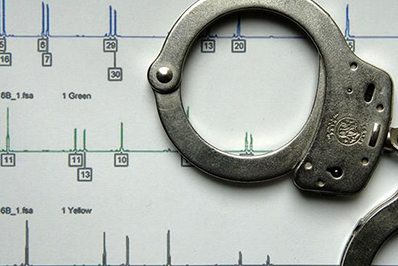By P J Klosinski
The end justifies the means, or we are protecting you so we demand taking your DNA without a warrant based upon probable cause. For several sessions, the Indiana General Assembly Members have introduced bills requiring DNA collection upon arrest.
SB 565 and HB 1015 in 2015 required every person arrested for a felony or as in the Senate bill “ for burglary, residential entry, a crime of violence, or a sex offense; and (2) a child found to be a delinquent child for the commission of an act that, if committed by an adult, would be burglary, residential entry, a crime of violence, or a sex offense; to provide a DNA sample.” Both bills provided for the expungement of a DNA sample if the person is acquitted of all felony charges, all felony charges are dismissed, or no charges have been filed after 30 days. There was also a provision which required the person taking the DNA sample to inform the arrestee of the right to DNA expungement and to provide a form to be used. In 2016 SB 191 and HB 1015 were introduced with identical language containing the expungement provision.
Indiana lawmakers have indicated the 2017 session will once again see a bill for the mandatory collection of DNA upon arrest for specified charges. The DNA is then placed in a national database. A major change this session makes it difficult to expunge DNA from the database. Under the new proposed bill, an individual would be allowed to remove their DNA from the national database only if they are acquitted of all charges. Gone are the privileges of being allowed to have your DNA removed if all felony charges are dismissed or no charges have been filed after 30 days.
 Black’s Law Dictionary 6th ed defines a constitutional right as “A right guaranteed to the citizens by the United States Constitution and state constitutions and so guaranteed as to prevent legislative interference therewith.”
Black’s Law Dictionary 6th ed defines a constitutional right as “A right guaranteed to the citizens by the United States Constitution and state constitutions and so guaranteed as to prevent legislative interference therewith.”
Indiana lawmakers are required before entering into office to take a Constitutional Oath which is compulsory under Indiana Constitution Article 15 Section 4. “ Every person elected or appointed to any office under this Constitution, shall, before entering on the duties thereof, take an oath or affirmation, to support the Constitution of this State, and of the United States, and also an oath of office.”
Indiana Constitution Section 25:” No law shall be passed the taking effect of which shall be made to depend upon any authority, except as provided in this Constitution”.
Does an oath or affirmation to support the Constitution of this State include adherence to
Section 25? Where does the provision exist for a law demanding DNA upon arrest absent warrant based upon probable cause? Where does the provision exist which states you will only have your seized property returned if you are found not guilty? Where is the provision which states government can determine you do not have the right to have your property returned if charges are dismissed or never filed?
Do the Constitutions of this State and the United States not provide for the protection of the individual right to be secure in our persons? Do Section 11 and Amendment IV not mandate the government must search and seize only upon a warrant issued through due process? Is being arrested enough according to required standards for the government to demand DNA and provide it to a national database? Does being given the privilege to have your DNA removed only upon acquittal meet the standards?
Indiana Constitution “Section 11. The right of the people to be secure in their persons, houses, papers, and effects, against unreasonable search or seizure, shall not be violated; and no warrant shall issue, but upon probable cause, supported by oath or affirmation, and particularly describing the place to be searched, and the person or thing to be seized.”
U.S. Constitution “Amendment IV The right of the people to be secure in their persons, houses, papers, and effects, against unreasonable searches and seizures, shall not be violated, and no Warrants shall issue, but upon probable cause, supported by Oath or affirmation, and particularly describing the place to be searched, and the persons or things to be seized.”
The hierarchy of law governing Indiana is declared to be: “ First. The Constitution of the United States and of this state. Second. All statutes of the general assembly of the state in force and not inconsistent with such constitutions. . .”
Where does the law governing this state include the exception for a law which is inconsistent with the constitutions? Where do the constitutions provide government the authority to justify the end by violating the means? Does the sworn oath of our representatives allow them to justify violations of inalienable rights when those rights are explained in plain, ordinary language and declared protected by the constitutions against government legislation?
If we desire to retain our individual inalienable rights all rights must be protected against unauthorized government acts even those acts which may seem to have an acceptable goal. Individuals have a right to justice under the rule of law but that rule of law foundation is the constitutions.
Article source
Indiana Constitution
U.S. Constitution

